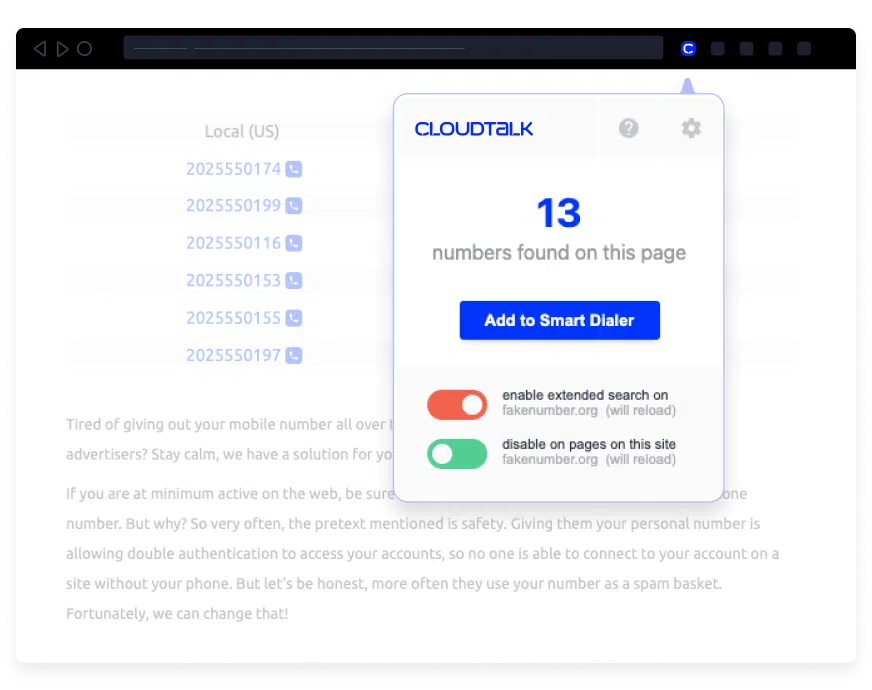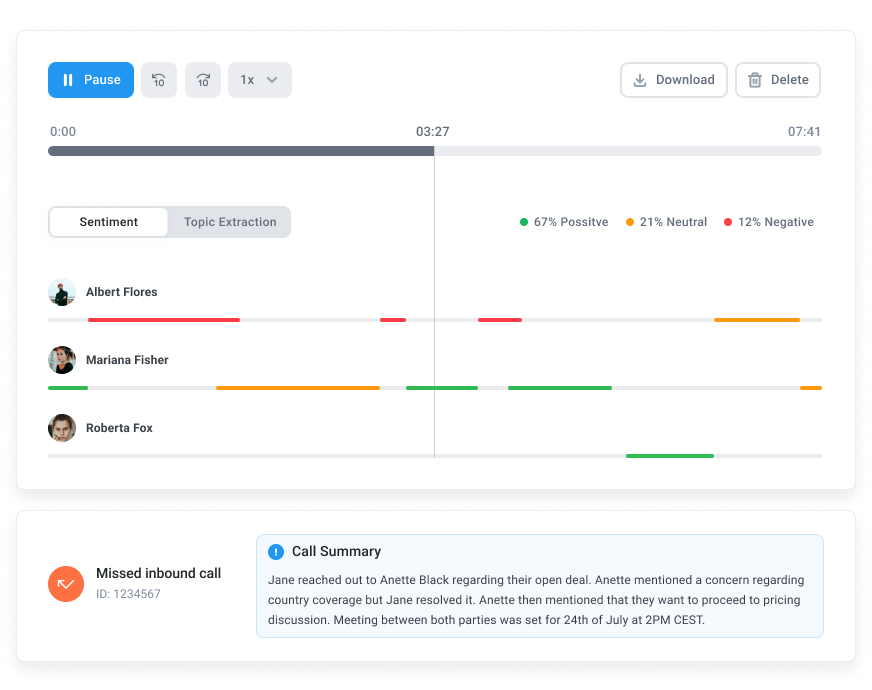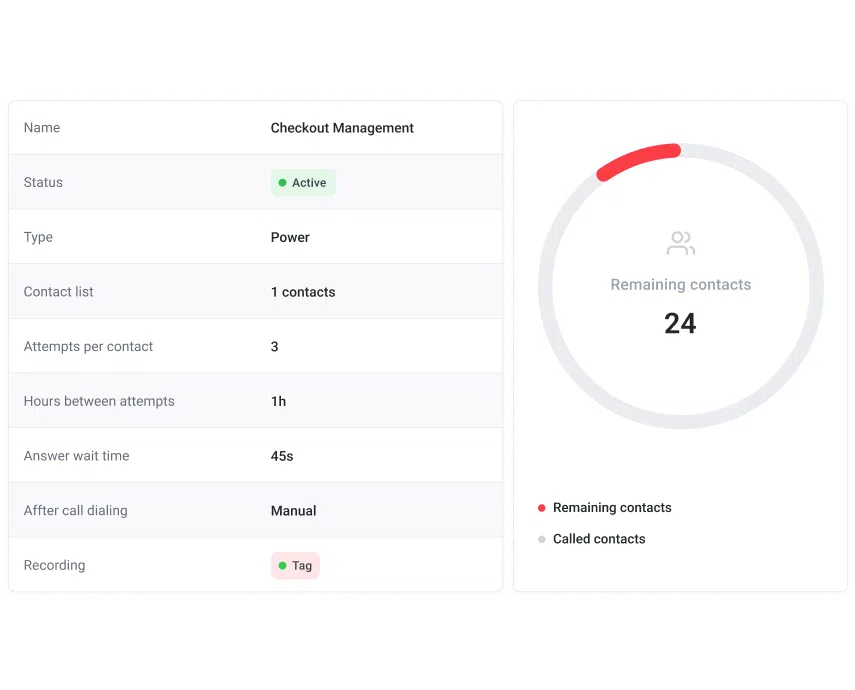Call Center Campaigns For Sales & Support

87% of consumers want proactive customer service from the companies they buy from.*
This means call centers are more than just customer service hubs—they’re revenue drivers, retention engines, and critical touchpoints for building long-term relationships.
But running effective call center campaigns requires strategy, the right technology, and real-time data insights to personalize every interaction.
Take Sophia, a Sales Operations Manager, who sees her team wasting time on unstructured follow-ups and missed connections with high-intent leads. Without AI-powered dialing and lead prioritization, deals keep slipping away. Meanwhile, Jason, a Customer Experience Lead, struggles with overwhelmed agents and long wait times. Simple requests clog the queue while urgent issues are left waiting due to inefficient call routing.
Like many call centers, their teams lack the structure and technology to maximize every interaction.
The solution? Call center campaigns that optimize every touchpoint—from outbound lead generation to inbound customer support—ensuring every call reaches the right person, at the right time, with the right context.
In this guide, we’ll explore how to design, execute, and optimize high-performance call center campaigns for both sales and support, using AI and automation to drive efficiency and results.
Key Takeaways:
- Call center campaigns help businesses boost revenue, improve customer retention, and streamline operations.
- CloudTalk’s Call Routing, Analytics, and Automation tools can improve the quality of your campaigns, which can build trust and lasting relationships
- Industry-specific strategies ensure campaigns align with business objectives and customer expectations.
Drive better sales and support outcomes
Understanding Call Center Campaigns
A call center campaign is a structured initiative designed to achieve specific goals, whether it’s generating leads, providing customer support, conducting market research, or reducing churn.
Types of Call Center Campaigns
Call center campaigns vary based on their purpose, whether it’s proactively reaching out to customers or handling inbound inquiries efficiently. Depending on the campaign type, different teams—sales managers, customer success leaders, marketing teams, or support supervisors—own the strategy and execution.
Let’s break down the most common outbound and inbound call center campaigns and who typically manages them.
Outbound Campaigns
Outbound call campaigns are typically led by sales, marketing, or customer success teams, depending on the campaign’s objective:
Lead Generation and Telemarketing (Owned by SDR Team Leads or Sales Managers)
Sales teams rely on predictive dialers and AI-powered lead scoring to reach high-intent prospects at the right time. Sales managers like Sophia can track connect rates, booked meetings, and conversion rates to measure success.
For example, a B2B SaaS sales team might use CloudTalk’s Smart Dialer to prioritize warm leads based on their website activity, automatically skipping unresponsive numbers to maximize rep productivity.

Customer Retention and Win-Back (Owned by Customer Success Managers or Retention Teams)
Customer success managers like Jason might use behavioral signals to proactively engage at-risk customers before they churn. The goal is to reignite engagement, address concerns, or offer incentives for renewal.
For example, a subscription-based company detects when a long-time user stops logging in, triggering an automated win-back call offering personalized discounts or additional support.
Market Research and Surveys (Owned by Marketing or Product Teams)
Marketing and product teams conduct outbound customer satisfaction surveys and feedback calls to understand market trends and user sentiment. Automating this process with AI-driven call campaigns improves response rates and provides deeper insights.
For example, after launching a new pricing model, a SaaS company runs an AI-powered post-call survey to measure customer reactions and identify pain points.
📌 Want to improve customer insights?
Inbound Campaigns
Inbound call campaigns are typically managed by support, operations, or revenue teams, ensuring fast response times and seamless customer experiences.
Customer Support and Technical Assistance (Owned by Support Managers or Contact Center Supervisors)
Support teams need real-time call routing and sentiment analysis to ensure high-priority tickets reach the right agents quickly.
For example, a telecom company uses CloudTalk’s AI-driven Sentiment Analysis to identify frustrated customers and immediately escalate them to a senior technical specialist.
Order Processing and Upselling (Owned by Revenue Operations or Customer Experience Leaders)
Revenue and customer experience teams use automated callbacks and AI-driven product recommendations to turn inbound calls into revenue opportunities.
For example, an e-commerce company uses AI-powered order tracking to automatically notify customers about complementary products while confirming their purchase.
By structuring both outbound and inbound campaigns effectively, businesses can ensure that each call is handled by the right team, with the right tools, at the right time.
Optimizing Call Center Campaigns with AI
Leaders like Sophia and Jason are looking for smarter ways to manage their call center campaigns—ones that don’t rely on manual processes, rigid call routing, and outdated dialing methods.
Let’s explore the key AI-driven strategies that can improve both sales and support call center campaigns.
Leverage AI-Based Call Routing for Personalization
Traditional call routing assigns agents based on static rules—such as department selection or customer account type. Call center automation and AI-driven call routing takes this further by using real-time data to match callers with the best agent based on:
- Expertise matching: AI ensures complex inquiries go to specialists rather than general agents.
- Previous interactions: Callers are connected to the same agent they spoke with before for a seamless experience.
- Sentiment Analysis: If a customer sounds frustrated, AI can prioritize routing them to an experienced agent.

Utilize Predictive Analytics for Sales Call Success
Sales teams often struggle with low connect rates and inefficient follow-ups, leading to missed opportunities and lost revenue. Predictive analytics solves this by using AI-driven insights to determine the best time to call, prioritize leads, and refine outreach strategies.
How predictive analytics improves sales calls:
- Optimized call timing: AI analyzes customer engagement patterns to identify when prospects are most likely to answer.
- Lead scoring and prioritization: AI ranks leads based on their likelihood to convert, ensuring reps focus on high-value contacts first.
- Behavioral insights: AI tracks past interactions, website visits, and engagement signals to suggest the right messaging for each prospect.
- Adaptive follow-ups: Instead of generic cadences, AI adjusts outreach timing and frequency based on response history.
Offer Real-Time Coaching for Agents
Even experienced agents can struggle with difficult customer conversations, objections, or compliance-heavy discussions. Without immediate feedback, small mistakes add up, leading to lost sales, frustrated customers, and inconsistent service quality.
AI-powered real-time coaching helps agents perform better by providing live guidance during calls, improving decision-making, and ensuring conversations stay on track.
How real-time coaching improves agent performance:
- Live whisper coaching: AI detects key moments in conversations and provides real-time script adjustments or suggested responses.
- Objection handling prompts: AI surfaces relevant rebuttals or product details when an agent faces a difficult objection.
- Compliance monitoring: AI ensures legal and regulatory language is followed, reducing compliance risks.
Automate Follow-Ups and Post-Call Analysis
Follow-ups are crucial for both sales and support, but manual tracking often leads to missed opportunities. AI automates post-call workflows, ensuring that every conversation is analyzed and acted upon.
- Call summaries: AI transcribes and highlights key points from the conversation.
- Next best action suggestions: Recommends follow-up tasks based on the call outcome.
- Automated reminders: Schedules check-ins or next steps automatically.
For example, an e-learning platform might use AI to analyze student inquiries and automatically schedule follow-up calls with admissions counselors—improving enrollment rates.
Industry-Specific Call Center Campaign Playbooks
Sophia and Jason’s challenges aren’t unique—every industry has specific needs when it comes to call center campaigns. A sales team in SaaS won’t operate the same way as a financial services firm handling high-value client accounts. Instead of generic strategies, businesses need tailored, step-by-step execution plans that align with their industry’s unique demands.
Below, we’ll break down real-world call center playbooks for different sectors, showing how AI-driven campaigns can improve sales, support, and retention efforts across industries.
Software & Tech
B2B Sales Acceleration Campaign
- A software company selling project management tools wants to increase demo bookings.
- AI analyzes website visitor behavior, flagging prospects who viewed the pricing page multiple times.
- Predictive dialers call these leads during their highest engagement window, increasing connection rates.
- AI-driven scripting helps reps tailor their pitch based on industry and company size.
Technical Support Triage
- A cloud security provider receives a spike in login issue calls after a major software update.
- Instead of sending every call to an agent, an IVR system automates troubleshooting, resolving simple issues.
- If a call requires human assistance, AI analyzes customer sentiment and urgency, escalating critical cases immediately.
Financial Services
High-Value Client Retention Campaign
- A private wealth management firm notices a client has liquidated a large portion of their assets.
- AI flags this as a potential churn risk, triggering a call from a dedicated relationship manager.
- The conversation uncovers concerns about investment fees, allowing the advisor to offer tailored solutions before the client moves to a competitor.
Fraud Prevention & Security Awareness
- A credit card provider detects unusual spending patterns on a customer’s account.
- AI initiates an automated outbound call, prompting the customer to confirm or dispute transactions.
- If fraud is suspected, 24/7 customer service automatically locks the account and routes the call to fraud prevention specialists.
Professional Services
Client Onboarding & Relationship Management
- A legal firm signs a new corporate client and needs to guide them through their service agreement.
- AI schedules automated follow-up calls at key milestones—after contract signing, after their first case review, and after 90 days.
- Agents use real-time call insights to assess client sentiment and adjust outreach strategy accordingly.
Cross-Selling & Upselling Campaigns
- A tax consulting firm calls a client to review their annual tax strategy.
- AI surfaces data showing that the client previously inquired about estate planning, flagging it as a relevant upsell opportunity.
- The consultant proactively introduces an estate planning package, increasing revenue without a cold sales pitch.
Education & E-learning
Student Enrollment & Retention Campaigns
- A university’s online program sees that a group of students hasn’t logged in for two weeks.
- AI flags these students as retention risks, triggering an outbound check-in call from a student success coach.
- The call uncovers technical difficulties as the root cause, allowing the school to provide immediate support and prevent dropouts.
Course Upsell & Engagement Campaigns
- A student completes an entry-level digital marketing course on an e-learning platform.
- AI analyzes their learning history and recommends a specialized certification program based on their interests.
- An outbound call campaign follows up, offering a limited-time enrollment discount, increasing course conversions.
Pro tip
Pro tip: CloudTalk makes monitoring call quality easy—including the success of your call center campaigns. Use custom Campaigns to better help agents structure their calls and make adjustments in real time—and improve your chances of success.

Transform Your Call Center Campaigns Today
Every industry has unique challenges and opportunities when it comes to call center campaigns. Whether it’s accelerating B2B sales, managing financial risks, strengthening client relationships, or driving student engagement, AI-powered call center solutions ensure businesses stay proactive, efficient, and customer-focused.
Sophia’s sales team no longer wastes time on unstructured follow-ups and cold calls to unresponsive leads. With CloudTalk, her reps connect with the right prospects at the right time, increasing conversions.
Meanwhile, Jason’s support team now routes urgent cases instantly, using call flows and Sentiment Analysis to improve customer satisfaction and agent efficiency.By leveraging CloudTalk’s call center solutions, organizations can optimize sales and support efforts, reduce inefficiencies, and drive stronger outcomes across every sector.
Turn every call into a customer
Sources:
Jive Ebook. Call Center Problems and How to Fix Them.
FAQs about call center campaigns
How do you outsource call center campaigns?
Outsourcing involves hiring third-party call center agents to manage incoming calls, outbound call center campaigns, and customer interactions efficiently.
What are examples of call center campaigns?
Common examples include outbound call center campaigns for lead generation, customer retention, and surveys, as well as customer interactions for support.
How do you get call center campaigns?
Businesses use call center software to run phone calls, outbound call center campaigns, and customer relationship strategies while tracking key KPIs and metrics.
Where can I find a list of call center campaigns?
You can explore call center software solutions that offer outbound call center campaigns, incoming calls management, and customer relationship tools.
What’s an example of a call center campaign provider?
Providers like CloudTalk offer call center software to help manage call center agents, campaign performance, KPIs, and phone calls for better customer relationships.





















